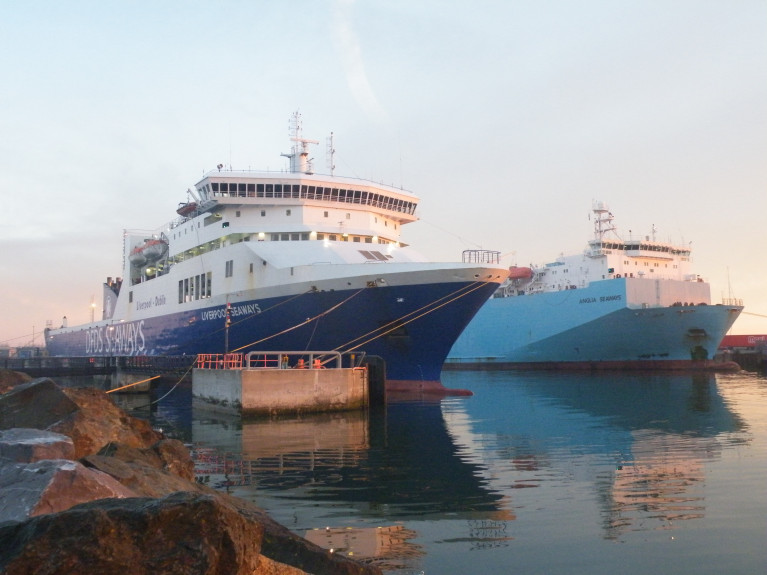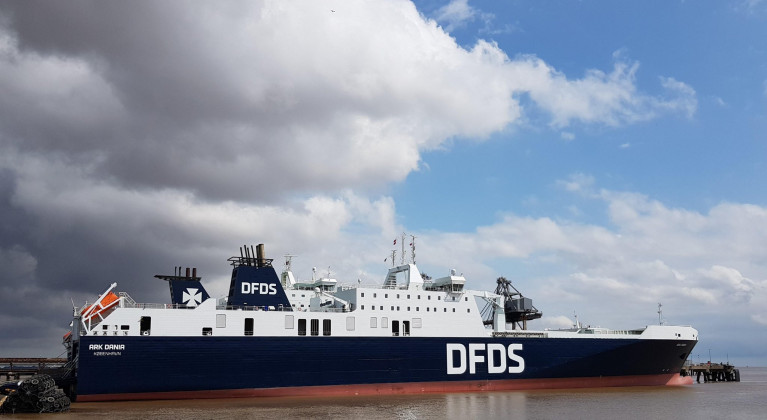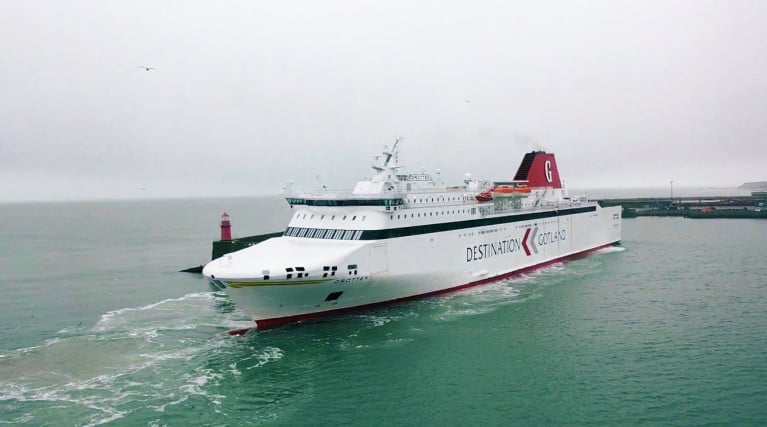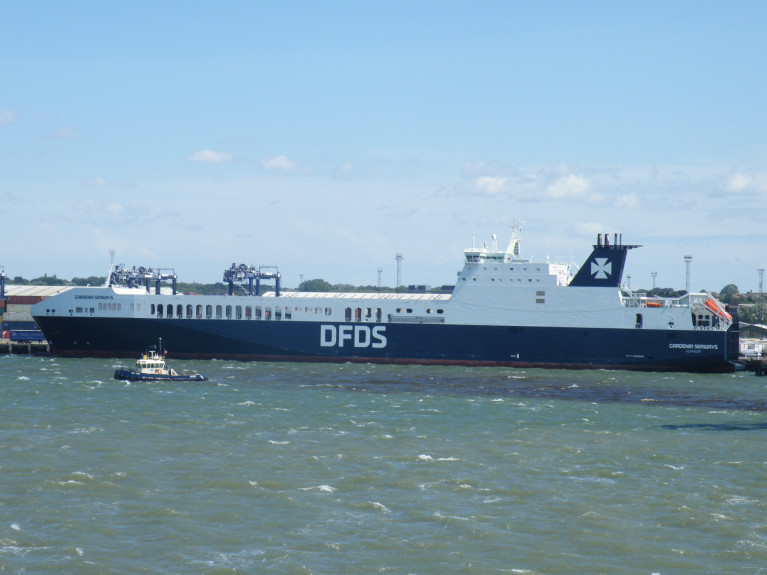Displaying items by tag: RosslareDunkirk
DFDS Expands Ireland-France Passenger Service of Rosslare-Dunkirk Due to High Demand
DFDS direct Ireland-mainland Europe ferry route of Rosslare-Dunkirk, as from today have special deals available to passengers booking in advance for travel in 2024.
The Ireland-France service, offers tourists, with up to 50 cabins available for customers to book on each sailing. There are five passenger departures from Rosslare Europort to Dunkirk each week and the overnight crossing takes just under 24 hours.
Last year Afloat reported of a trial passenger service which was added to freight operations avoiding the UK landbridge, and so the route has become increasingly more popular.
In addition to cabin accommodation, all passenger bookings include meals with freshly cooked breakfast, lunch, and dinner on offer in the self-service restaurant onboard during the journey. For those wishing to stay connected online WiFi is available onboard with a free basic service and premium packages available to purchase for those looking to stream.
Standard prices for a car and four passengers with a cabin start from €400 each way, but a 20 per cent discount is available for customers who book early, providing the opportunity to save on the costs of the journey and spend more on the holiday experience.
The Early Booking Offer applies to standard vehicle and cabin fares on the Rosslare service and is available for all bookings made by 29 February 2024.
Dunkirk is a fantastic arrival port for passengers looking to explore Northern Europe. Disneyland Paris is three-and-a half hours’ drive from the port, while Bruges is just 80 minutes away. We have seen strong demand for passenger crossings on the Rosslare to Dunkirk service since we launched a limited trial in August last year.
Over the summer we offered a full passenger service on the route and with our great value early booking offer we expect to welcome even more customers on board to enjoy the comfortable, relaxing experience we offer. With our straight-forward booking and check-in process, no baggage limits to worry about, and time to relax during the crossing, families can sail into a stress-free holiday by sea.
Rosslare Europort user DFDS is to trail a new passenger ferry service on their existing freight route to Dunkirk, which began sailings early last year between Ireland and France. The inaugural passenger sailing is to take place this Friday, 5 August.
For the first time, DFDS will offer tourists a direct link between South-East Ireland and Northern France (see Irish minister opens terminal). The new service will be focussed on car and motorhome traffic at launch, with limited capacity to complement our freight traffic.
Chris Parker, route director, said: "We launched a freight service between Rosslare and Dunkirk in January 2021, and it has proved extremely popular with customers looking to move goods between Ireland and continental Europe without the need to use the land-bridge via the UK. Adding passenger services to the route will further strengthen the service, and we expect strong demand from holidaymakers in Ireland and Northern Europe. Rosslare is at the heart of the 'sunny southeast' and a short drive from Dublin and Cork, making it a popular destination. Irish customers will benefit from a direct link into the heart of Europe."
Crossings on the route will take 24 hours, with the overnight sailings allowing customers to relax and recharge before driving on to their holiday destination. Against a looming summer of disruption at airports, the launch of the new route offers a stress-free alternative for holidaymakers looking to get away. No luggage restrictions apply when you take your car to Europe by ferry.
There will be up to five sailings per week from Rosslare to Dunkirk, and prices for a car and four passengers with a standard cabin onboard will start from €550, with all meals included.
As Afloat reported last week, DFDS has acquired an Irish haulier to compliment and expand the ferry's firm's logistic operations, though the acquisition is subject to regulatory competition clearance.
Following Irish Ferries two-month charter in February of a Meditteranean ferry, DFDS, operator of the new Rosslare Europort-Dunkirk freight route is to introduce a ferry from Marseille next week, writes Jehan Ashmore.
Pelagos, will become the fifth ferry so far involved since DFDS launched the direct Ireland-mainland Europe service in early January. This to bypass Brexit, benefitting freight hauliers by avoiding the British land-bridge and potential delays associated in UK-EU customs paperwork.
The debut of Pelagos is to replace a ferry, the Drotten that only entered service in late January.
Afloat confirmed with DFDS as to when the Pelagos starts serving hauliers on the direct Ireland-France route. The link that transits the entire English Channel and into the Celtic Sea takes almost 24 hours to connect continental Europe.
The operator stated that Pelagos will take over from Drotten, which is scheduled to make a final outbound sailing from Rosslare on Monday night. On the next day, Pelagos will then be slotting into service also from Rosslare by taking up a sailing bound for Dunkirk.
As of other ropax's that have come and gone on the route, Pelagos is a product of the popular Visentini shipyard built class ropax, which had been in the Mediterranean. A repositioning voyage took five days as the ferry arrived to the northern France port on Thursday.
The 114-freight trailer unit ferry has been chartered back to its previous owner DFDS which as their Liverpool Seaways served DFDS Dublin-Birkenhead (Liverpool) route more than a decade ago.
As Afloat reported then the Liffey-Mersey link (incl. 'foot' passengers) was DFDS final presence on the Irish Sea when it closed in January, 2011. The Danish operator having in July 2010, for the first time entered the Irish Sea market. Albeit, merely 'months' later their other Irish Sea routes and vessels were sold to Stena Line.
Returning to Rosslare where Drotten, it is understood whose operator Destination Gotland AB, require the vessel back in the Baltic Sea to serve between the Swedish island and the mainland.
Drotten, had only entered service in late January, having replaced DFDS Optima Seaways, which launched the new route by making a maiden sailing, two days post-Brexit on 2nd January.
Earlier this month, DFDS announced it was to introduce their Ark Dania, as the route's fourth vessel next month. A maiden call in Dunkirk is scheduled on 1st April.
With this fast-changing ferry scene, Afloat take a recap on the current three-strong fleet, prior to the pending departure of Drotten to Scandinavia.
The ferries involved are Visby, same class of the Drotten, and also chartered from the Swedish operator. In addition the Visentini ropax Kerry on charter from Stena RoRo.
A fourth freight-ferry DFDS is to be added to the Rosslare Europort-Dunkirk route on 1st April, the direct Ireland-mainland Europe service via France, that avoids the UK had only began just after Brexit, on 2nd January.
The Danish operator DFDS will introduce their freight-ferry Ark Dania (2014/33,333grt). Capacity is for 188 truck units (including 12 driver accompanied units and 176 unaccompanied units/trailers). Sailing time is approximately 23 hours 45 minutes.
Since the UK left the EU, the direct service has been favoured by haulage companies and industry alike, as it avoids the delays, border checks and complicated paperwork that come with using the UK as a land-bridge.
Upon arrival in Dunkirk or Rosslare, the drivers are fully rested and can continue driving immediately to reach many major destinations within the rules for driving limits.
Currently three ferries, (Afloat adds ropax Kerry and also chartered fast-ropax pair Drotten and Visby), offer a cost-efficient alternative for trade between Ireland and continental Europe. The additional capacity by Ark Dania, also gives customers an opportunity to grow their business post Brexit.
Aidan Coffey, Route Director, says: “Ark Dania is an important addition to the route. It’s a very versatile ferry capable of carrying diverse types of cargo. It will also free up capacity on our three other ferries for more driver accompanied freight units”.
“We have strong demand from all sectors of industry looking to use the direct route to North Central Europe, as more and more realise the benefits of using the direct route compared to the UK land-bridge”.
The inaugural sailing earlier this year, Afloat highlights involved another DFDS owned ship, ropax Optima Seaways. Deployment of Ark Dania, will see this much larger freight ferry which is scheduled to make it’s maiden call in Dunkirk on 1st April.
DFDS Introduce Larger Freight Ferry At Rosslare As Europort Continues By-Passing Brexit
Ferry changes yet again took place at Rosslare Europort as the ropax Drotten made a first arrival from Dunkirk, France, the bypass Brexit route that DFDS only launched this month, writes Jehan Ashmore.
Afloat first became aware of the Drotten when tracked at anchor off the Wexford port this morning. It transpires from further research that according to Rosslare Europort (the chartered ropax) Drotten arrived (yesterday) to replace Optima Seaways on the Rosslare to Dunkirk service.
The south-east port, notably operated by Irish Rail (Iarnród Éireann) added the Drotten will increase freight capacity on the Ireland-mainland Europe route operated by the Danish ferry and logistics company.
Afloat adds that the introduction of Drotten will also assist hauliers by addressing an inbalance in capacity logistics given the ropax is a sister of Visby which arrived to the port this morning. This ferry is also chartered from Destination Gotland, a Swedish operator serving the large island of Gotland located in the southern Baltic Sea.
Both of the Chinese built 29,746 gross registered ropax's date from 2003 will operate along with the final existing third ferry, the slightly smaller 25,263grt Kerry. The Italian 'Visentini' built ropax also dating from 2003 is of similar design to the Optima Seaways.
The ropax pair and Kerry, each have a capacity of up to 125 units. They take a mix of freight vehicles in the form of driver accompanied trucks, un-accompanied trailers which include ambiant and refridgerated units.
The trio operate an instensive 6-days a week sailing schedule on the near 24-hour duration route to the northern French port which provides hauliers a much needed alternative to the UK land-bridge. This enables clients to remain within the EU and avoid as required new UK customs and delays, though the land-bridge routes via the Irish Sea and the Port of Dover is faster and for some cargoes still remains convenient.
As for the whereabout of Optima Seaways, the 'Visentini' also built ropax, formed the only ferry of the original trio serving on the new Ireland-France route owned by DFDS. As such this ship apty made the maiden crossing.
Afloat has since tracked this morning the ropax's return to Klaipeda, Lithuania. The two-day repositioning voyage from Ireland to the Baltic state, is no surprise given Optima Seaways has since 2012 operated for DFDS on the Klaipeda route to Karlshamn in Sweden.
The Sweden-Lithuania route runs south of Gotland and so the influence of Scandinavian operators continues to be reflected strongly on the Irish ferry scene, a ro-ro role which has taken place for decades.
A new ferry route between Rosslare Europort and Dunkirk in northern France offering a six-day weekly service has been announced by logistics giant DFDS.
The new direct ro-ro service is aimed at giving hauliers and the wider Irish industry sector a new option to replace the UK landbridge, post-Brexit, amid fears of hours-long delays on the landbridge once customs and other checks come into force in the new year.
Starting on 2 January, the new service will bring to 13 the number of direct sailings between Rosslare Europort and the European continent, each way, every week, during peak times of year.
"This is a hugely exciting development, not only for us in Rosslare Europort, but for Ireland as a whole, Irish industry, and the haulage sector", port general manager Glenn Carr said this morning.
Fears have been expressed by many in international trade recently about the effects which Brexit will have on Irish business, particularly because of anticipated lengthy delays in the UK because of the need to have customs checks for traffic travelling between that country and EU countries.
Irish hauliers currently complete tens of thousands of journeys across the landbridge and into the continent every year.
RTE News reports more on the new direct ro-ro service to mainland Europe.



























































